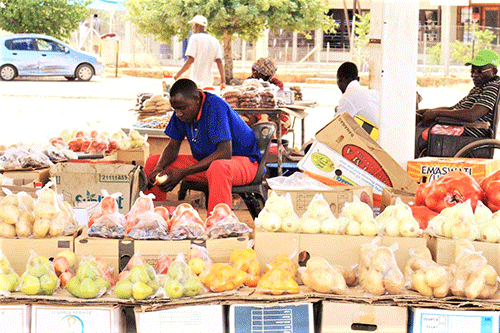Deputy minister of industrialisation and trade, Verna Sinimbo last week undertook a visit to informal traders in Windhoek’s Samora Machel constituency to investigate how informal traders were reverting to normality after the devastating impact of Covid-19 and its associated lockdowns.
In general, economists agree that small and medium-sized enterprises (SMEs) play a key role in global economies by virtue of their contribution to economic growth and employment creation.
“Informal traders play a very important part in uplifting the domestic economy especially during the time of the effects of the pandemic. During the lockdown imposed by government in 2020, we realised that some informal traders were affected but most of them were keeping our economy afloat, meaning their contributions cannot be ignored,” said Sinimbo.
She added the ministry realised the importance of informal traders and has drafted a policy aimed at how best the ministry can promote informal trading in creating a conducive environment for their businesses to thrive.
Part of her visit was to urge informal traders to take advantage of arrangements and initiatives by the ministry: “The ministry is here to inform them of different initiatives in place, so that we see more products coming from Namibia penetrating global markets. We need to make them understand and look beyond the domestic market”.
Sinimbo mentioned one of the arrangements is the African Growth and Opportunity Act (AGOA). This is a two-decades-old utilisation strategy with a specific objective to increase Namibia’s exports to the United States. This strategy is a joint effort between the US Agency for International Development (USAID) and Namibia’s trade ministry and forms part of US efforts to expand mutually beneficial trade with Namibia. AGOA enables Namibia to export over 6 400 products tariff-free to the US market.
Meanwhile, during last week’s visit, the Samora Machel constituency councillor, Nestor Kalola, said he requested land from the City of Windhoek for the construction of an open market for informal traders. This, he said, would ensure the traders have a conducive environment to conduct their business.
“Most of these traders are family heads who really need assistance from different angles. Families depend on these heads of families for all aspects of daily life including taking kids to school and feeding them,” said Kalola.
The ministerial delegation also visited Penduka Village, a rural setting on the shoreline of Goreangab Dam. The village consists of lodging, a restaurant, convention facilities and various recreational facilities for visitors and guests. All facilities are run by the women of Penduka who are trained to create high quality handmade arts and crafts.
Director of Penduka Village, Andy Diergaardt, noted Covid-19 severely hampered their trade and revenue. This led to the retrenchment of 18 employees, with only 21 remaining, three of whom are male.
“We tried, by all means, to keep running the establishment and not to retrench our women, but things beyond our control happened. I am happy to say the number of visitors at our places is now picking up,” Diergaardt added. -mndjavera@nepc.com.na


